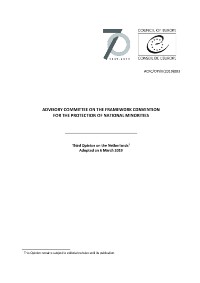https://tandis.odihr.pl/handle/20.500.12389/22596
| DC Field | Value | |
|---|---|---|
| Country Coverage | Netherlands | |
| Accessioned Date | 2020-02-11T15:05:48Z | |
| Availability Date | 2020-02-11T15:05:48Z | |
| Issue Date | 2019 | |
| URI | http://hdl.handle.net/20.500.12389/22596 | |
| Abstract | "EXECUTIVE SUMMARY The Netherlands continues to maintain a high standard of protection of the rights of the Frisian national minority and significant investments have been made in particular in the fields of education, language and culture. The Province of Fryslân received more competencies in the field of education, which paved the way for a long-term policy in this regard. The respective competencies of central and provincial authorities are clearly defined in administrative agreements that are regularly reviewed by means of consultation. One of the key issues of concern is the lack of Frisian language teachers and, more generally, the still limited Frisian writing skills. As regards the right to use the Frisian language in court, a lack of Frisian-speaking interpreters and court staff represents a practical barrier to its effective implementation. The administrative reform involving mergers of municipalities entailed risks for the Frisian language in the sense of weakening its use. In all areas, the Advisory Committee considers that more effective consultation and participation of associations representing the Frisian minority is important. Despite its long tradition of tolerance and openness to other cultures and many measures to promote an inclusive society, Dutch society is increasingly challenged by racism, Islamophobia, and anti-Semitism. Some divisive and xenophobic messages feed into the mainstream political discourse. Owing to the absence of a functioning consultative structure and cuts in funding for minority NGOs, minority groups have fewer opportunities to make their voices heard and to contribute to the integration of society from their own perspective. Roma, Sinti and Travellers continue to be excluded from the scope of application of the Framework Convention. Those belonging to these groups experience discrimination in many areas, in particular as regards housing, where a recently adopted improved governmental policy requires urgent implementation at local level. The absence of a strategic approach and an effective and sustainable consultative mechanism hampers the implementation of policies which aim to improve the situation of persons belonging to such communities." | |
| Format | ||
| Language | en | |
| Publisher | Council of Europe | |
| Subject Keywords | racism and xenophobia | |
| Subject Keywords | hate crime | |
| Title | Third Opinion on the Netherlands | |
| Material Type | country report | |
| Corporate Authors | Council of Europe (COE). Advisory Committee on the Framework Convention for the Protection of National Minorities | |
| Key Issues | Hate crime | |
| Key Issues | Racism and xenophobia | |
| Document Number | ACFC/OP/III(2019)003 | |
| Physical Description | 41 p. | |
| URL more information | https://rm.coe.int/090000168096953e | |
| Fulltext | With Fulltext | |
| Fulltext Grant | open | |
| Related Country | OSCE region | |
| Related Country | UN region | |
| Related Country | EU region (pre-2021) | |
| Related Country | CoE region | |
| Related Country | EU region (post-2020) | |
| Appears in Collections: | Resources on hate crime Resources on racism and xenophobia Documents | |
Files in This Item:
| File | Description | Size | Format | |
|---|---|---|---|---|
| 22596_EN.pdf | English | 975.15 kB | Adobe PDF |  |

